Latest news
29 September 2022
ESA selects Harmony as Earth Explorer Flagship Mission
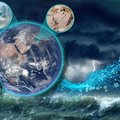
After years of in depth scientific and technical studies, ESA member states have formally selected Harmony as its 10th Earth Explorer flagship mission, set to be launched in 2029. Harmony was proposed in 2018 by an international scientific team lead by Dr. Paco López Dekker. Earth Explorer (EE) missions address questions that have a direct bearing on climate change research and other societally relevant issues.
30 August 2022
Bert Wouters in NRC, Standaard, Scientias en Atlas: smelten van de ijskap

Wat gaat de Groenlandse ijskap doen? Het is in een wereld die rap opwarmt nog niet zo eenvoudig om dat te voorspellen. Er zijn wel computermodellen die de interactie tussen het klimaat en de ijskap beschrijven, maar die zijn niet perfect, zo stelt onderzoeker Bert Wouters, verbonden aan de Universiteit Utrecht en TU Delft. “Ze doen hun werk goed, maar er zitten nog onzekerheden in.
22 August 2022
20 million EU Grant for research underground heat storage
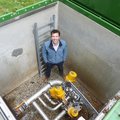
The EU aims to have a net-zero greenhouse gas (GHG) economy by 2050. At present, heating and cooling represent around 50% of the final energy demand in Europe and are for a large part supplied by fossil fuel derived energy. Large scale seasonal heat storage is a key strategy to decarbonize heating in order to achieve EU ambitions, because sustainable sources like geothermal and solar provide a lot of heat in summer, while we need it in winter. The PUSH-IT consortium receives this Horizon Europe grant to demonstrate and develop such heat storage systems. PUSH-IT stands for Piloting Underground Seasonal Heat Storage In geothermal reservoirs.
16 August 2022
A deep dive into the blue waters of Curaçao

Environmental Engineering student Jessie-Lynn van Egmond is on a thesis adventure, hunting down old groundwater wells to analyse their water quality. So how is the island’s fresh water doing? Has it been subject to salinization or other pollution trends? That’s what Jessie-Lynn hopes to find out.
02 August 2022
How coastal seas help the ocean absorb carbon dioxide from the atmosphere
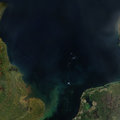
The biologically productive North Sea impacts the global climate through exchange of carbon and nutrients with the Atlantic Ocean. A Dutch consortium of scientists will investigate how big this role of the North Sea really is. Under the leadership of the Royal Netherlands Institute for Sea Research (NIOZ), conduct a combination of field studies and computer model simulations will be conducted over the next four years to address this question. Models will be used to determine future effects of environmental and climate change on the North Sea, Atlantic Ocean and ultimately Earth’s climate. TU Delft's Peter Herman and Bram van Prooijen (Civil Engineering & Geoscience) are involved in the research.
07 July 2022
PATH2ZERO: transition to zero-emission inland shipping
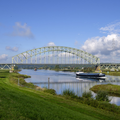
NWO has awarded a research grant to a consortium led by Alex Kirched for the project PATH2ZERO: PAving THe way towards Zero-Emission and RObust inland shipping. PATH2ZERO aims to contribute to the transition to zero-emission inland shipping in cooperation with the inland shipping sector. The consortium of researchers, companies and social organisations will start developing sustainable business models and action perspectives.
28 June 2022
TU Delft researchers: sea level rise along Dutch coastline accelerating
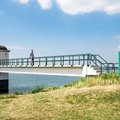
De zeespiegelstijging langs de Nederlandse kust is aan het versnellen. Dat melden wetenschappers van de TU Delft in een nieuwe studie. Uit een uitgebreide analyse van de metingen van acht getijdestations langs de Nederlandse kust (onder meer die van Maassluis, Delfzijl en Vlissingen) blijkt dat de gemiddelde zeespiegelstijging – sinds midden jaren negentig – 2.7 ± 0.4* millimeter per jaar is. In vergelijking tot de zeventig jaar daarvoor is dat een significante stijging van 1.0 ± 0.5 mm/jaar.